Key takeaways:
- Effective mentoring requires active listening and empathy to fully support the mentee’s unique challenges and emotional state.
- Mentoring is a reciprocal relationship where both the mentor and mentee learn from each other, enhancing mutual growth.
- Setting clear expectations and being adaptable to the mentee’s needs are crucial for creating a productive mentoring experience.
- Sharing personal experiences and vulnerabilities fosters trust and openness, encouraging mentees to engage more deeply in the mentoring process.
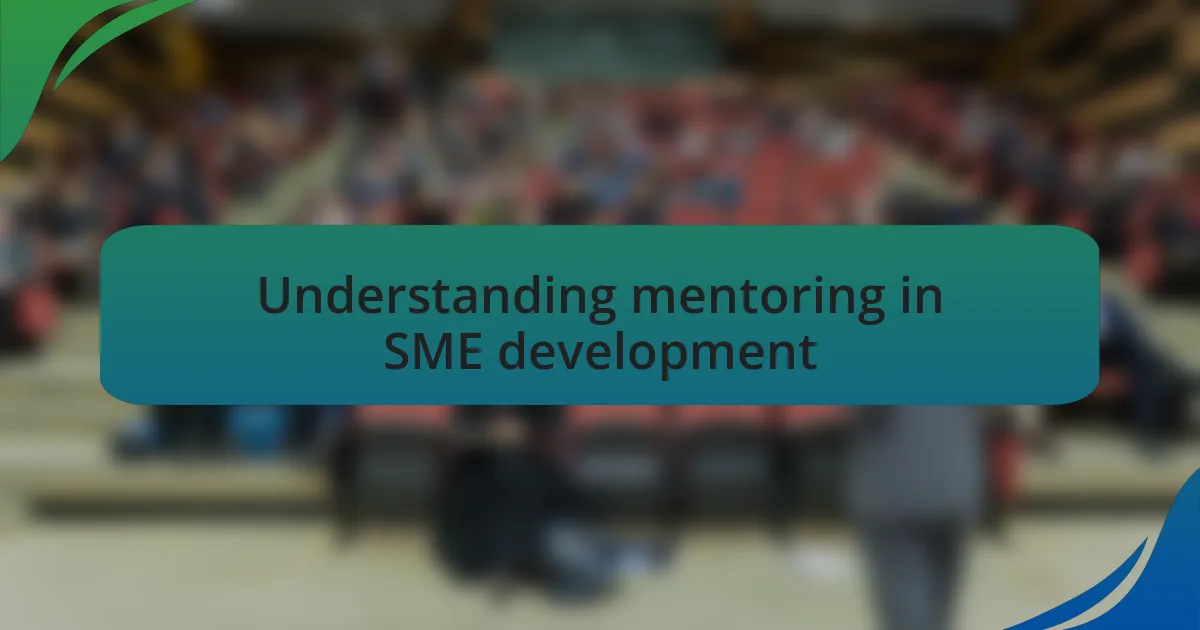
Understanding mentoring in SME development
Mentoring in SME development is more than just guidance; it’s about building relationships rooted in trust and understanding. Reflecting on my own experiences, I remember my first attempt at mentoring an entrepreneur who was passionate but lacked direction. I thought I had all the answers, but I quickly realized that my approach was more about offering solutions rather than facilitating self-discovery. Have you ever found yourself in a situation where you were so intent on helping that you overlooked what the mentee really needed?
At its core, effective mentoring involves listening and responding to the unique challenges faced by SMEs. I encountered a situation where I focused too heavily on strategy, neglecting the emotional hurdles my mentee faced. The look of frustration on their face was a wake-up call for me. In that moment, I understood that mentorship should foster an environment where individuals feel comfortable sharing their fears and aspirations. How can we truly support growth if we don’t first acknowledge the personal journey of those we mentor?
Moreover, the dynamics of mentoring in SME development can vary greatly depending on the personalities involved. I vividly remember a mentoring session that began with enthusiasm but ended in awkward silence because I failed to connect on a personal level. This taught me that successful mentoring requires adaptability and an awareness of the mentee’s emotional state. Have you ever considered how your approach might change if you genuinely empathized with the struggles of your mentee? Recognizing their emotional landscape can make a substantial difference in the mentoring outcome.
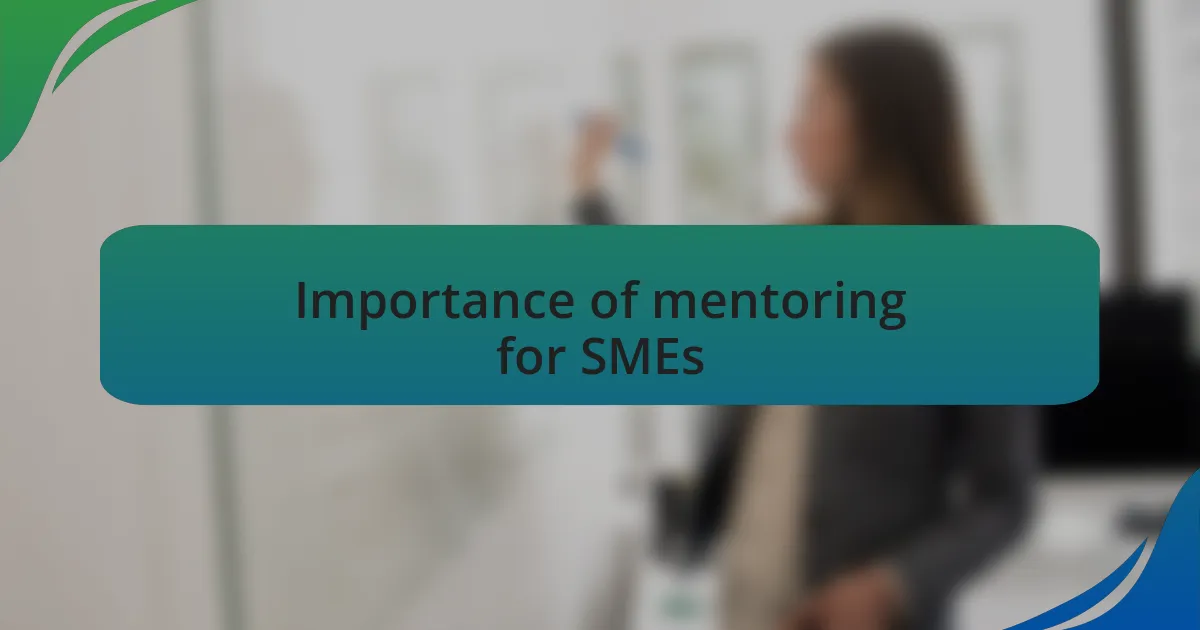
Importance of mentoring for SMEs
When discussing the importance of mentoring for SMEs, it’s impossible to overlook the role of guidance in navigating the often unpredictable waters of entrepreneurship. I recall a small business owner I mentored who was grappling with scaling their operations. Our conversations often focused on practical steps, but I found myself reflecting more on the emotional support I provided. It had a profound impact on their journey, showing me that mentoring is not just about offering knowledge but also about being a reassuring presence.
Mentoring serves as a lifeline during challenging times, allowing SMEs to tap into a wealth of experience and insight. For instance, I once supported a startup that experienced a significant setback. Instead of merely discussing business strategies, I shared my own failures and lessons learned. This vulnerability encouraged them to share their insecurities, demonstrating that mentorship is as much about shared experiences as it is about imparting wisdom.
Additionally, the reciprocal nature of mentoring enhances its value for both parties. I remember while mentoring an enthusiastic entrepreneur, I realized that our discussions opened my eyes to innovative ideas that I had never considered. This teach-and-learn dynamic creates a rich environment for growth. Have you ever thought about how much you learn from your mentees through these interactions? Embracing this relationship can lead to mutual development, pushing the boundaries of what we can achieve collectively.
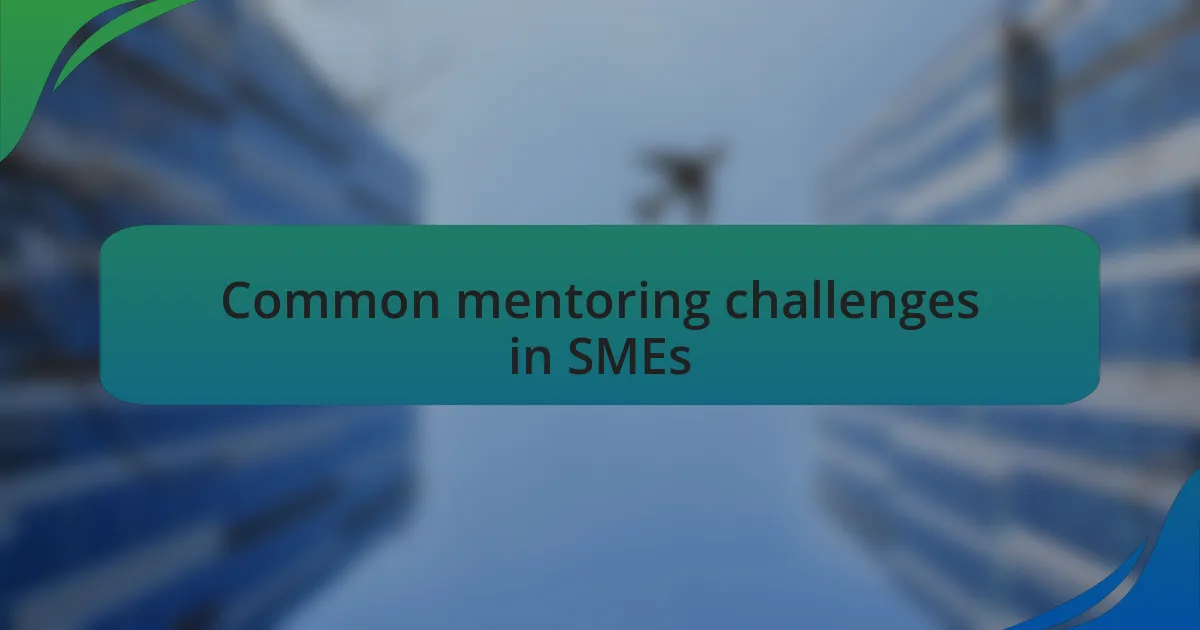
Common mentoring challenges in SMEs
One challenge I frequently encountered in mentoring within SMEs is the lack of time. Small business owners often find themselves juggling countless responsibilities, leaving little room for mentoring sessions. In one instance, I worked with a client who wanted my guidance but struggled to allocate time for our meetings. This made it difficult for us to make consistent progress. Have you ever tried to mentor someone who seems constantly pulled in different directions? It can be frustrating for both parties.
Moreover, mismatched expectations can create tension in mentoring relationships. I once mentored an entrepreneur who envisioned a different approach to our discussions; they wanted detailed operational strategies, while I believed in broader, high-level insights. This disconnect led to many unproductive sessions, leaving both of us feeling unsatisfied. It’s essential to clarify goals and share expectations upfront—something I learned the hard way. Have you faced similar situations where the mentoring focus didn’t align with the mentee’s needs?
Lastly, navigating the often informal structure of SMEs can present its own set of challenges. During one of my mentoring experiences, I noticed that the informal relationship dynamics sometimes overshadowed the professional guidance I aimed to provide. Friends can easily transition into mentors, but maintaining that balance requires constant effort and awareness. How can we ensure that informal relationships still respect the mentoring structure? Recognizing these nuances is vital to establishing a fruitful mentoring environment.
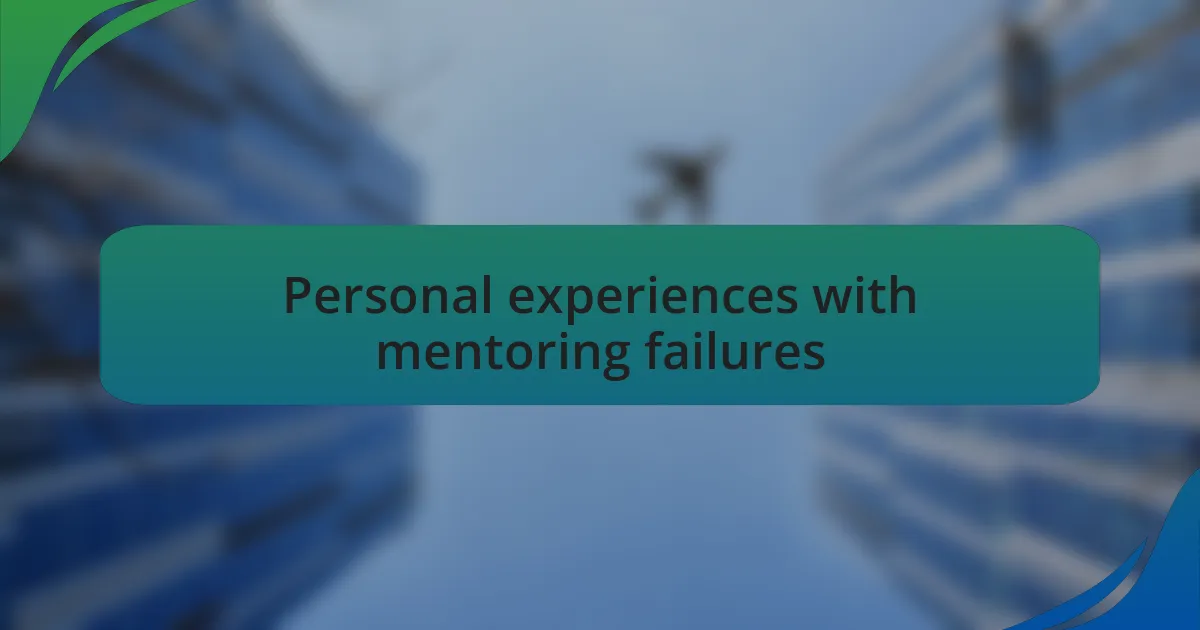
Personal experiences with mentoring failures
Reflecting on my experiences, I remember a mentoring engagement that began with great enthusiasm but quickly spiraled into chaos. My mentee seemed eager at first, but I soon realized they were overwhelmed by their own tasks, which led to our sessions frequently being rescheduled. It was disheartening to see how my well-intentioned guidance was overshadowed by their inability to prioritize, leaving me questioning how to bridge that gap between mentorship and the mentee’s actual circumstances.
Another time, I misjudged the readiness of a mentee to engage in deeper conversations. I approached our meetings with a wealth of ideas but quickly discovered that they were not prepared for the level of discussion I had anticipated. It felt like I was speaking two different languages, and I found myself frustrated and uncertain about how to adjust my approach. Have you ever tried to push someone before they were ready? That experience taught me to stay attuned to the mentee’s pace rather than my own ambitions.
On a different occasion, I was mentoring a group of entrepreneurs, and I made the mistake of treating each mentee the same way, without considering their individual needs. What was meant to be collaborative quickly became confusing, as I failed to address the unique challenges each person faced. Watching their faces shift from confusion to frustration made it clear to me: mentoring isn’t a one-size-fits-all model. I learned that personalizing my approach could be the key to unlocking their potential, something I aim to apply in every future mentoring relationship.
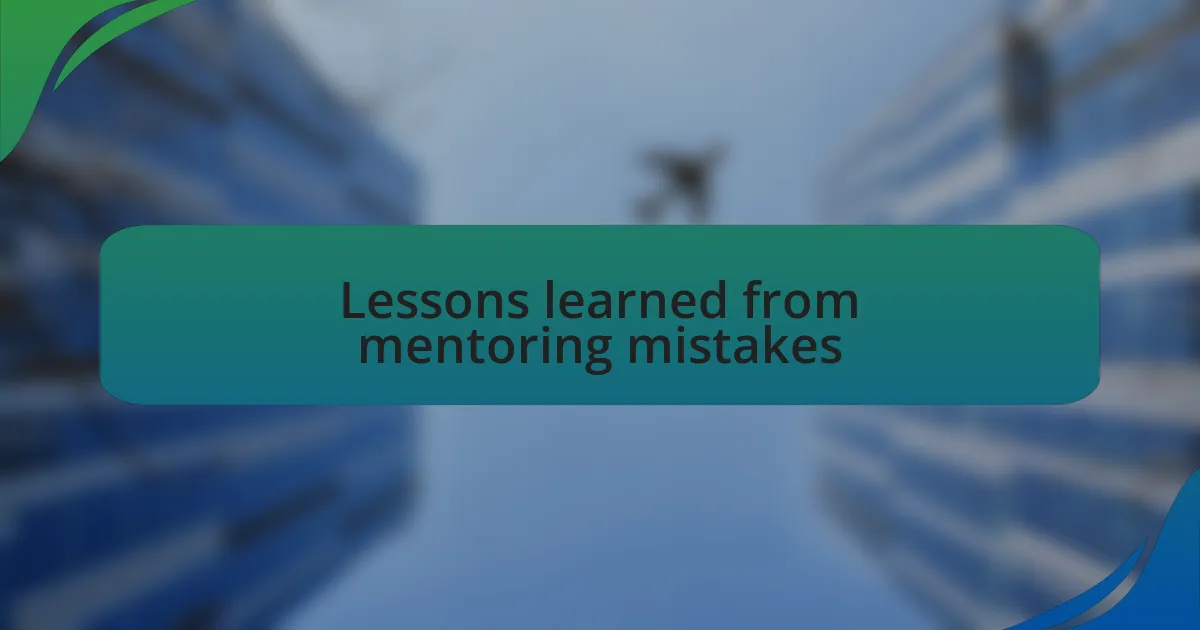
Lessons learned from mentoring mistakes
One of the most significant lessons I’ve learned from my mentoring failures is the importance of active listening. There was a time when I was so focused on delivering my knowledge that I overlooked what my mentee was really trying to communicate. I recall a face-to-face session filled with my insights, yet I noticed my mentee’s eyes drifting. When I finally paused to ask how they were feeling, it hit me—they needed support and understanding, not just information. This experience reshaped how I approach mentoring; now, I prioritize creating a space where my mentees feel heard.
I also discovered that setting clear expectations at the outset is crucial. In a recent mentoring relationship, I assumed we were aligned on goals without explicitly discussing them. I thought we had made progress, only to find out my mentee felt lost and unfocused. It was frustrating for both of us—why had I not taken the time to clarify our objectives? This taught me that transparency isn’t just a nicety; it’s an essential part of the mentoring process. Establishing a mutual understanding fosters a more productive environment where everyone is on the same page.
Moreover, my experiences have underscored the significance of flexibility in mentoring. I vividly remember a session where I had prepared an extensive lesson on strategic planning, but my mentee came in brimming with anxiety about a recent setback. Instead of pivoting to address their emotional state, I stubbornly stuck to my plan. Looking back, I understand that meeting my mentee where they were at would have built trust and shown that their concerns genuinely mattered. This has motivated me to remain adaptable, recognizing that sometimes the most meaningful breakthroughs occur when I allow space for mentees to express their pressing needs first.
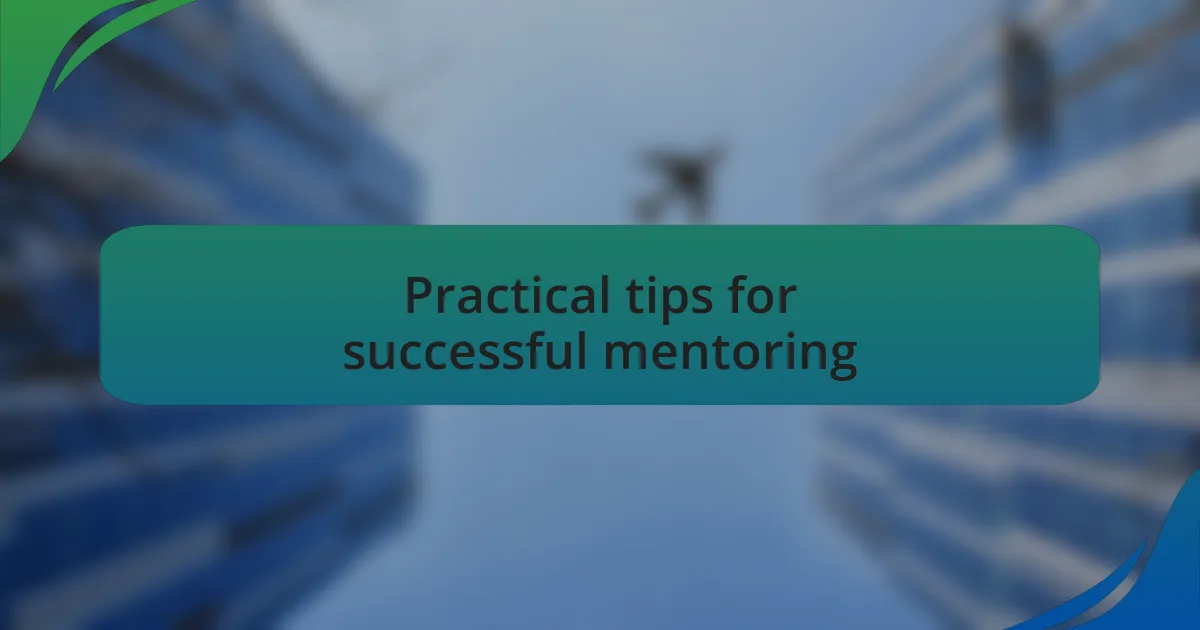
Practical tips for successful mentoring
Creating a successful mentoring relationship requires an active commitment from both parties, and I can’t stress enough the importance of creating a safe environment. In one instance, I worked with a mentee who was hesitant to share their challenges because they feared judgment. It became clear to me that I needed to cultivate trust by being more vulnerable myself. So, I shared my own struggles in a relevant context. This sparked openness, and suddenly, we were able to engage on a deeper level. Have you ever thought about how sharing your own experiences might encourage your mentees to do the same?
Another tip is to keep the conversation focused on the mentee’s goals rather than simply imparting your own life lessons. I remember a time when I was eager to share my success stories, thinking they would inspire my mentee. Instead, I found them disengaged, as my tales didn’t resonate with their unique aspirations. By shifting my approach to ask open-ended questions about their ambitions, I learned to guide them in defining their path. How often do we unintentionally make the mentoring experience about ourselves?
Lastly, I’ve found that regular check-ins significantly enhance the mentoring experience. Instead of waiting for our scheduled meetings, I began sending brief messages to my mentees to see how they were doing. This proactive approach not only kept the communication lines open but also made my mentees feel valued and supported. I realized that mentorship is not just about scheduled sessions; it’s about being there throughout the journey. When was the last time you reached out just to check in on your mentee? It can make all the difference.
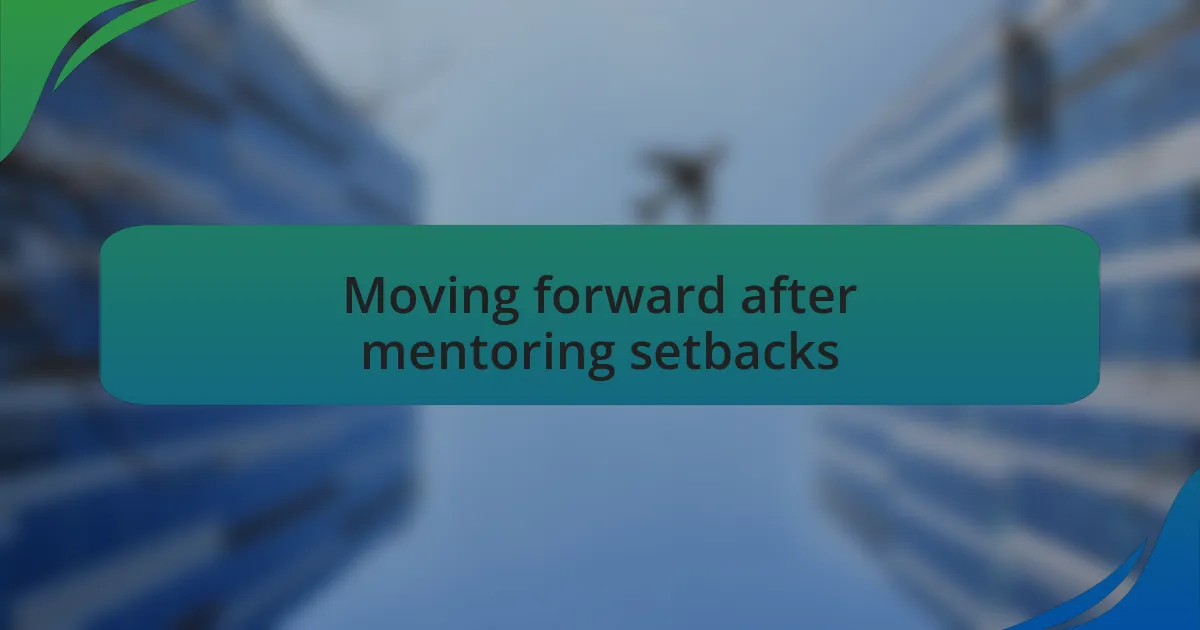
Moving forward after mentoring setbacks
Mentoring setbacks can be tough, but I’ve learned that reflecting on what went wrong is crucial. I recall a particularly challenging session where I lost patience with a mentee who wasn’t progressing as quickly as I had hoped. This experience was humbling and forced me to reassess my expectations. Have you ever had that moment when you realized it’s not just about the mentee’s pace, but also about your own approach?
Moving on from these setbacks requires a willingness to adapt. After that difficult session, I sought feedback from peers and experienced mentors to gain new perspectives. One mentor reminded me that every mentee is different, and it’s essential to tailor my approach to fit their unique learning style. This resonated deeply with me. How often do we forget that flexibility can be a mentor’s greatest strength?
Finally, I’ve discovered that embracing vulnerability plays a transformative role in moving forward. Sharing my own mentoring missteps with future mentees created a sense of camaraderie and opened the door for honest dialogue. It’s remarkable how acknowledging my failures encouraged my mentees to share their struggles without fear. Isn’t it powerful to think that showing our imperfections can build a stronger mentoring bond?